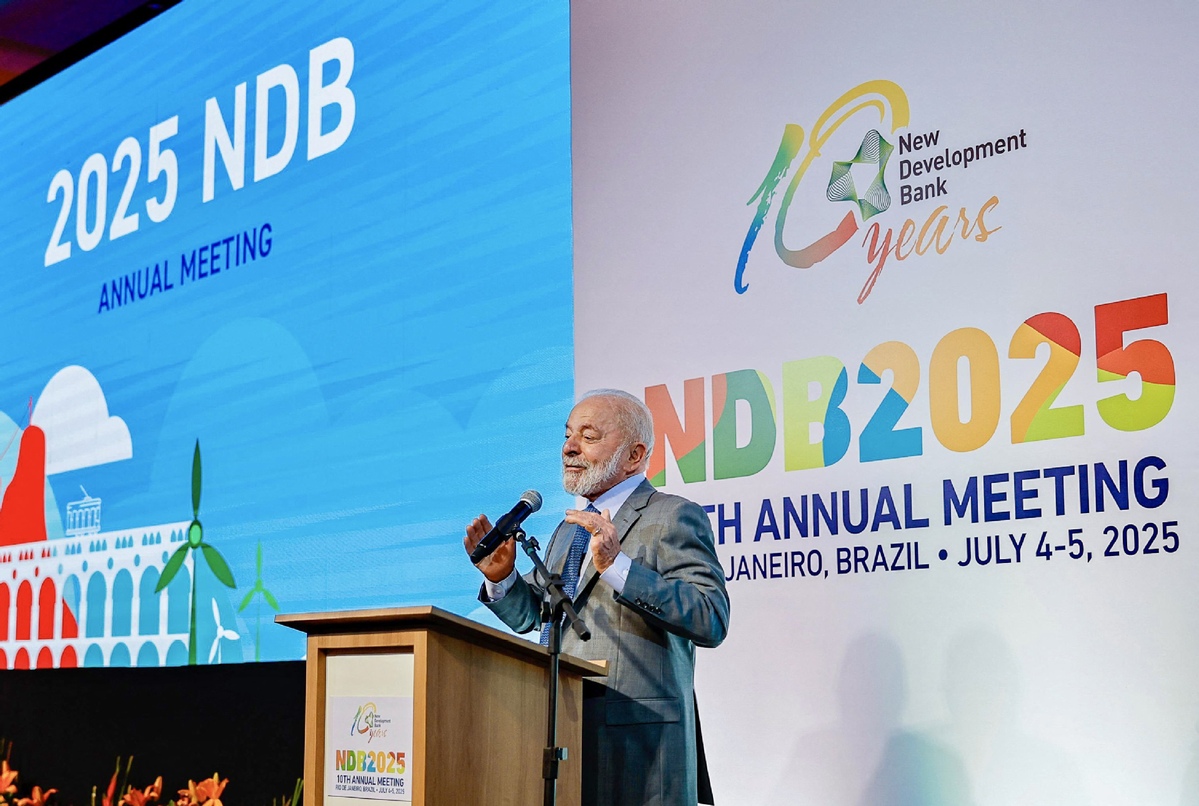
The BRICS Summit offers a platform for Global South countries to voice their perspectives and demonstrate their commitment to building a more inclusive, equitable, and sustainable world, experts said.
Themed "Strengthening Global South Cooperation for More Inclusive and Sustainable Governance", the 17th BRICS Summit is being held in Rio de Janeiro, Brazil, from Sunday to Monday.
"The growing significance of BRICS on the global stage is increasingly clear, both in demographic and economic terms. With its recent expansion, BRICS now represents about 41 percent of the world's population, roughly 4 billion people," said Evandro Menezes de Carvalho, a professor of international law at Fluminense Federal University in Brazil.
READ MORE: Li urges BRICS to lead in advancing global governance reform
He said the original five BRICS countries account for over 35 percent of global GDP based on purchasing power parity, while the expanded BRICS+ group represents more than 40 percent, exceeding that of the G7 group of developed nations.
Carvalho also said the BRICS-led New Development Bank has emerged as a pioneering initiative for countries seeking sustainable and inclusive growth.
Over the past decade, the NDB has approved more than 120 projects worth a total of $40 billion, offering financial support to member countries across various sectors, including infrastructure, clean energy, environmental protection, and digital development.
"This is important to emphasize that BRICS pursues an agenda that extends beyond economics to include political objectives, particularly the reform of global governance structures. Therefore, the NDB is open to all countries and offers greater financing opportunities for developing nations," he said.
Colombia and Uzbekistan have joined the New Development Bank, the institution's president, Dilma Rousseff, announced on Saturday.
The bank's board of governors approved the accession of the two countries, bringing the total membership to 11.
Shakeel Ahmad Ramay, CEO of the Asian Institute of Eco-civilization Research and Development in Pakistan, said that collaboration is essential to addressing today's global challenges and those that lie ahead, and thus BRICS focuses on mitigating the gaps between the Global South and the Global North, creating opportunities for inclusive and mutually beneficial development.
"Many developing countries are grappling with a severe financial crisis and facing tough conditions imposed by Western financial institutions. In this context, the NDB and the Asian Infrastructure Investment Bank are seen as credible alternatives to traditional Western lenders," he said.
There is growing confidence that these institutions can serve as valuable partners in advancing sustainable development and driving the digital transformation of emerging economies, he said.
In April, United States President Donald Trump imposed "reciprocal" tariffs of up to 50 percent on most of the US trading partners, causing disruption to the global economy and triggering heightened volatility in international markets.
During the BRICS Summit, participating countries unitedly criticized the recent trade disputes, according to a draft summit statement obtained by Agence France-Presse on Saturday.
Tariff concerns
"We voice serious concerns about the rise of unilateral tariff and non-tariff measures which distort trade and are inconsistent with WTO rules," the draft text said.
It warned such measures "threaten to further reduce global trade "and are "affecting the prospects for global economic development".
Alana Camoca, a professor of political science and international relations at Rio de Janeiro State University, told China Daily that the current geopolitical and trade uncertainties underscore the need for BRICS countries to strengthen internal cohesion and uphold strategic autonomy.
"To promote a more balanced multilateral dialogue that truly reflects the diverse interests of its members, BRICS must first enhance internal coordination and present a unified voice in international forums," she said.
ALSO READ: Malaysian PM: BRICS grouping opportunity to create fairer world order
"Such cohesion is essential for advancing systemic reforms that reflect the priorities of developing nations, particularly in areas like international trade and climate action."
"Trade offers a powerful avenue for strengthening ties within BRICS, as the group includes some of the world's largest trading economies. By promoting intra-BRICS trade, the bloc can help stabilize global markets and serve as a driver of inclusive economic growth," Ramay from Pakistan said.
Camoca said that by presenting a united front, BRICS could position itself as a decisive force in countering rising illiberal tendencies in global governance, helping to bridge the gap between emerging economies and traditional power centers.
Agencies and Xinhua contributed to this story.
Contact the writer at liujianqiao@chinadaily.com.cn


